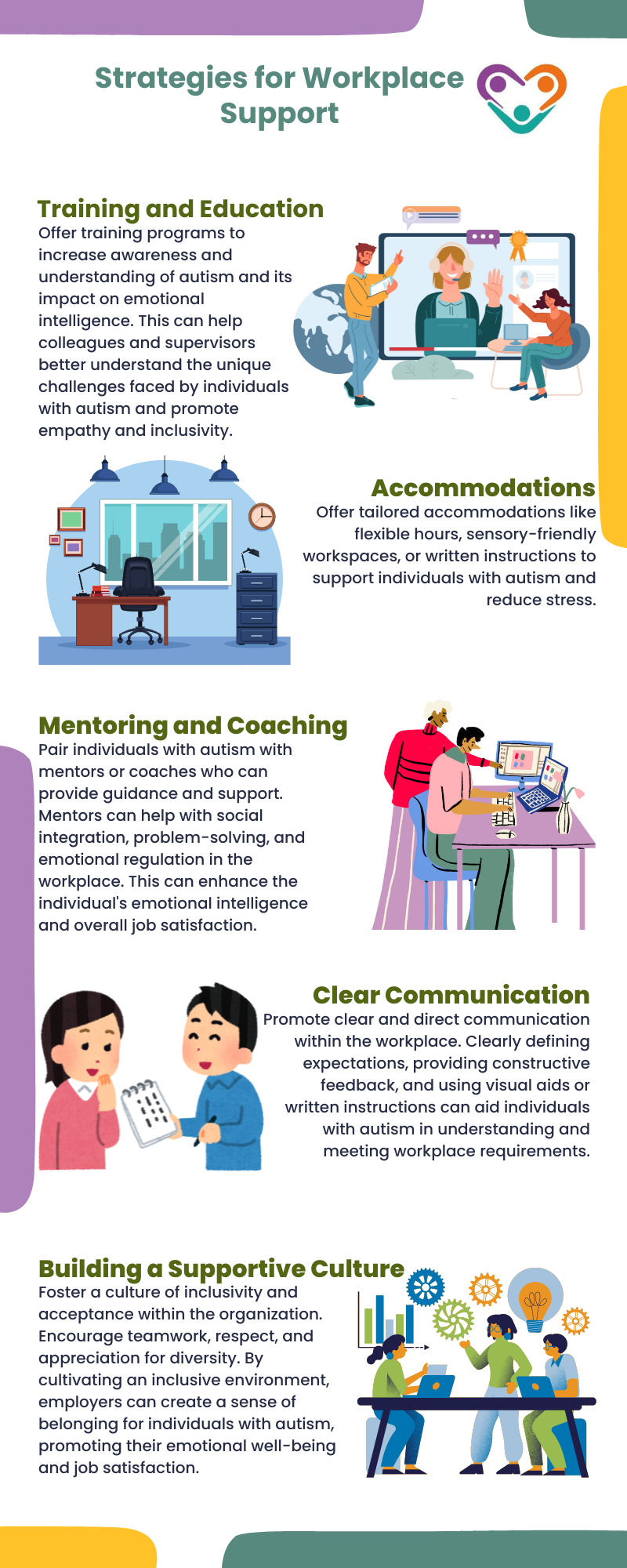Emotional intelligence is the ability to recognize, understand, and respond to your own emotions and the emotions of others. It influences how we perceive and express emotions, how we navigate social relationships, and how we regulate our own emotions.
By being aware of our emotions and the emotions of those around us, we can effectively manage conflicts, communicate effectively, and establish meaningful connections.
For people with autism, however, this can sometimes be more challenging. According to research, a lot of autistic individuals display lower levels of emotional intelligence which puts them at a disadvantage within the workplace and other social settings.
In this article, we’ll explore what emotional intelligence means for people with autism, why it might be more difficult, and ways to support growth in this area.
Components of Emotional Intelligence
Emotional intelligence comprises several components that contribute to our overall ability to understand and manage emotions. These components include the following:
- Perceiving Emotions: This component involves recognizing and identifying emotions in oneself and others. It is the foundational step in emotional intelligence, as it enables individuals to accurately interpret emotional cues.
- Facilitating Thought: Emotional intelligence also involves the ability to use emotions to facilitate thinking and decision-making processes. Emotions provide valuable insights and can influence our cognitive processes, such as problem-solving and creativity.
- Understanding Emotions: Understanding emotions involves comprehending the causes and consequences of emotions. It entails recognizing the complex interplay between emotions, thoughts, and behaviors.
- Managing Emotions: The final component of emotional intelligence is the ability to regulate and manage emotions effectively. This includes the skill of recognizing and controlling one’s own emotions and responding appropriately to the emotions of others.
Researchers and professionals can gain a more nuanced understanding of how autistic individuals may excel or face challenges in specific areas by breaking down emotional intelligence into these components. This knowledge can inform interventions and support strategies aimed at enhancing emotional intelligence and overall well-being in autistic individuals.

Emotional Intelligence in Autistic Adults
Emotional intelligence plays a crucial role in understanding and managing emotions, as well as navigating social interactions. While research has shown that many autistic individuals may exhibit lower levels of trait emotional intelligence, it is important to examine emotional intelligence through its separate components to gain a more comprehensive understanding.
One of the challenges that autistic adults may face is in perceiving emotions accurately. Difficulties in recognizing facial expressions, tone of voice, and other nonverbal cues can make it challenging to understand the emotions of others.
This can lead to misunderstandings and social difficulties.
Understanding emotions is another aspect of emotional intelligence that may present challenges for autistic adults. The ability to interpret and comprehend complex emotions, as well as discerning the emotions underlying others’ behavior, may require additional effort and support.
Autistic individuals may struggle with the Theory of Mind, which is the ability to understand that others have different thoughts, feelings, and perspectives.
Importance of Emotional Intelligence in the Workplace
Recognizing the importance of emotional intelligence in the workplace is crucial, especially when it comes to individuals with autism.
Emotional intelligence plays a significant role in work performance. It encompasses the ability to recognize, understand, and manage one’s own emotions, as well as the emotions of others.
In other words, individuals with higher emotional intelligence tend to navigate social interactions more effectively, communicate clearly, and handle conflicts in a constructive manner.
For autistic individuals, challenges in perceiving and understanding emotions may impact their ability to build relationships and collaborate with colleagues. Difficulties in recognizing social cues and non-verbal communication can hinder their integration into the workplace.
Recognizing these challenges and providing appropriate support will allow employers to help their autistic employees thrive in the workplace.
Strategies for Workplace Support
Creating a supportive work environment is essential for individuals with autism to maximize their potential. Here are some strategies that employers can implement to provide workplace support:

By implementing these strategies, employers can support individuals with autism in developing and utilizing their emotional intelligence effectively. This not only benefits the individual but also contributes to a more harmonious and productive work environment for all employees.
Emotional Intelligence Interventions
There have been efforts to develop interventions that specifically target the enhancement of emotional intelligence skills among autistic individuals. These interventions can be beneficial in improving social and emotional skills, behavior, academic performance, and overall well-being.
There are two prominent approaches in this area which are as follows:
Social and Emotional Learning Programs
Social and Emotional Learning (SEL) programs, also referred to as emotional intelligence interventions, have demonstrated significant gains in various domains for children who participate in these programs.
These programs focus on developing skills related to self-awareness, self-management, social awareness, relationship-building, and responsible decision-making. They aim to improve emotional regulation, empathy, communication, and problem-solving abilities.
Research has shown that participation in SEL programs can lead to improvements in social and emotional skills, behavior, academic performance, and overall well-being of children. These programs provide structured learning experiences that incorporate evidence-based strategies, such as role-playing, group discussions, and reflective exercises.
Adaptations for Autistic Children
While SEL programs have shown promising results for neurotypical children, adaptations are often necessary to cater to the specific needs of children with autism. These adaptations focus on providing additional support and strategies that address the unique challenges faced by autistic individuals in understanding and expressing emotions.
Adapted emotional intelligence interventions for children with ASD may include visual aids, social stories, and explicit instruction on recognizing facial expressions and emotions. These adaptations take into account the individualized needs of each child, offering tailored strategies to enhance emotional intelligence skills.
By incorporating visual cues and structured activities, these interventions can help children with ASD develop a better understanding of emotions, improve social interactions, and enhance their overall emotional well-being.
These adaptations empower children with ASD to effectively navigate and respond to emotional situations, fostering greater emotional intelligence.
It is important to note that emotional intelligence interventions should be individualized and implemented in collaboration with professionals experienced in working with individuals with ASD.
Emotional Coping Strategies in Autistic Children
Autistic children often face unique challenges when it comes to regulating their emotions. They may struggle with identifying and understanding their own emotions, as well as those of others.
As a result, they may exhibit difficulties in expressing their feelings appropriately and managing emotional situations effectively.
To help children with ASD enhance their emotional regulation skills, a range of coping strategies can be implemented. These strategies aim to support children in recognizing their emotions, developing self-control, and responding in a constructive manner.
Some effective coping strategies include:
- Visual Supports: Visual aids, such as emotion charts or social stories, can assist children with ASD in identifying and labeling different emotions. These visual cues provide a concrete reference point for understanding and expressing feelings.
- Sensory-based Techniques: Autistic children often have unique sensory sensitivities. Incorporating sensory-based techniques, such as deep pressure activities or calming sensory toys, can help them regulate their emotions by providing a soothing and grounding experience.
- Social Skills Training: Teaching social and communication skills can empower children with ASD to navigate social interactions more effectively. This includes teaching them to recognize social cues, interpret nonverbal communication, and engage in appropriate problem-solving strategies.
- Self-monitoring and Self-reflection: Encouraging children with ASD to reflect on their emotions and behaviors can promote self-awareness and self-regulation. This can be done through journaling, discussing emotions with a trusted adult or therapist, or using self-monitoring tools to track emotional states.

Importance of Effective Regulation
Effective emotional regulation is crucial for children with ASD as it has a significant impact on their overall well-being and daily functioning. When children with ASD struggle to regulate their emotions, it can lead to behavioral challenges, increased stress levels, and difficulties in social interactions.
By enhancing emotional regulation skills, children with ASD can experience numerous benefits, such as:
- Improved Self-control and Impulse Management: Effective emotional regulation allows children to respond to challenging situations in a more controlled and thoughtful manner, reducing impulsive behaviors.
- Enhanced Social Interactions: When children with ASD can regulate their emotions effectively, it supports their ability to engage in positive social interactions, fostering meaningful relationships with peers and family members.
- Reduced Anxiety and Stress: Developing coping strategies and emotional regulation skills can help alleviate anxiety and stress levels in children with ASD, promoting a more balanced emotional state.
- Increased Resilience and Adaptability: Effective emotional regulation enables children with ASD to adapt to changes and cope with challenging circumstances, enhancing their resilience and problem-solving abilities.
In the end, understanding autism and emotional intelligence is about embracing the unique ways emotions are felt and expressed. By offering patience, support, and empathy, we can help individuals on the spectrum navigate their emotions confidently.
Always keep in mind that emotional intelligence might look different in autism, but it’s there ready to be nurtured and celebrated. If you’re seeking support, ABA therapy in New Jersey, Indiana, Georgia, and New York is available through Golden Care Therapy. Contact us today to learn more about how we can help.



